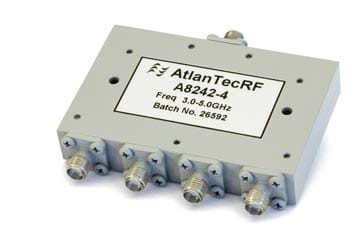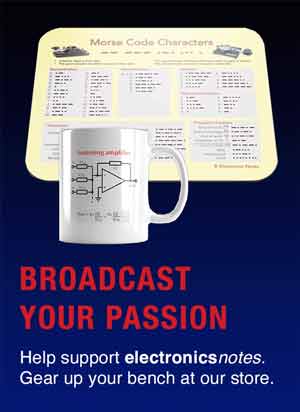Hybrid RF Combiner, Splitter / Divider
Hybrid RF combiner / splitter/ divider circuits have the advantages of lower loss over their resistive counterparts.
Home » Radio & RF technology » this page
RF Combiner Splitter Couplers & Hybrids Includes:
Combiner, splitter, coupler hybrids overview
Splitters & Combiners
Resistive splitter & combiner
Hybrid splitter & combiner
Wilkinson splitter & combiner
Directional coupler
Hybrid RF combiner-splitters enable much higher levels of performance to be achieved than with simple resistive elements.
The splitter-combiners that use resistors introduce additional loss as a result of the resistors used. When hybrids are used, it is possible to reduce the power lost as heat to relatively low levels.
This means that hybrid combiner-splitters are used where performance is an issue, although cost and difficulty of design are greater.
The names, RF splitter hybrid, divider hybrid or combiner hybrid all refer to the same types of element - power dividers and power splitters being the same name fort he same function and a power combiner is the reverse of a splitter.

Hybrid splitter, divider, combiner advantages and disadvantages
As may be imagined, hybrid splitters and hybrid combiners have a number of advantages and disadvantages. These need to be considered when deciding what form of splitter /divider / combiner to use or design into some equipment.
Hybrid splitter combiner advantages
- Loss: Using hybrid splitters / hybrid dividers / hybrid combiners, much less power is lost than if a resistive function had been used. When used as a splitter or divider the main level reduction is caused by the action of dividing the power between several ports. Some power will be lost in the hybrid - transformer - but this is often low.
Hybrid splitter combiner disadvantages
- Complexity: Hybrid power dividers, splitters and combiners utilise transformers and these make them more complicated to manufacture. Careful design of the transformer along with careful manufacture is required to ensure that the correct performance is obtained.
- Frequency response: The frequency response of many hybrid splitters, hybrid dividers and hybrid combiners is more limited than their resistor based counterparts. Transformers have limited frequency ranges and this limits the overall range of the hybrid. When designing or specifying a hybrid combiner, splitter or divider, the frequency response needs to a prime consideration.
- Cost: Using transformers, hybrid combiners, hybrid dividers or hybrid splitters are more costly - transformers require careful construction and are considerably more complicated than resistors which are widely available and cheap.
Hybrid splitter / combiner circuits are always used where loss is an issue. They are able to provide little resistive power loss and as a result they are far more efficient. Careful design is needed because they incorporate transformers and this typically limits their frequency response and it can also provide some issues with impedance matching. However the technology used these days means that the performance is normally very good.
 Written by Ian Poole .
Written by Ian Poole .
Experienced electronics engineer and author.
More Essential Radio Topics:
Radio Signals
Modulation types & techniques
Amplitude modulation
Frequency modulation
OFDM
RF mixing
Phase locked loops
Frequency synthesizers
Passive intermodulation
RF attenuators
RF filters
RF circulator
Radio receiver types
Superhet radio
Receiver selectivity
Receiver sensitivity
Receiver strong signal handling
Receiver dynamic range
Return to Radio topics menu . . .



